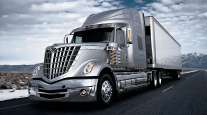Senior Reporter
Navistar Takes New Path Toward Market Gains

[Stay on top of transportation news: Get TTNews in your inbox.]
LISLE, Ill. — Navistar International Corp. announced it is pushing into 2020 with plans for a new truck plant, electric trucks and a Class 8 with a Level 2 option, and it will place greater reliance on a single-vehicle platform to optimize R&D, parts and tooling.
“In the last few years, something absolutely profound has happened. We are becoming a company that people want to do business with. After several years of concerted effort, the International brand is back,” Navistar Chairman and CEO Troy Clarke told financial analysts and trade media Sept. 19 during its first investor day since 2015.
Company executives said Navistar has done much to overcome the loss of reputation and customers after its previous MaxxForce engines that did not meet the more stringent phased-in federal emissions standards of 2007-10. The company’s previous senior management claimed at the time they would be compliant when it sold them. Navistar this May set aside $135 million to settle a related class action suit.
Navistar’s International is “a renewed brand,” Clarke said. The company has four broad product lines — medium-, heavy- and severe-service trucks along with school buses — that can be split into 34 potential customer segments, and it is “easier to attack” segments adjacent to where it is already doing business.

Clarke
The new truck plant in San Antonio will make Classes 6-8 trucks. The company will spend $250 million to build the plant and plans to break ground on the property later this year. Production is expected to begin about two years later.
At the same time, the company is seeing strong demand and rapid adoption of advanced driver assistance systems in the North American truck market, Clarke said.
“We are working with suppliers to market in early 2020 an integrated Level 2 ADAS option,” he said. “This is a technology where we had the opportunity to develop a common platform with Traton for the next iteration of this product.”
Level 2 automation means the truck, with a driver in the cab, is capable of independent steering, accelerating and braking. Traton, the truck and bus subsidiary of Volkswagen AG, owns about 17% of Navistar.
Clarke said the initial focus on electrified vehicles will include Classes 6-7 trucks and school buses. Navistar created a new e-mobility business unit based in the Detroit area to work with suppliers.
It is expanding its engine plant in Alabama to accommodate next-generation, big-bore diesel powertrains that Traton also will help develop.

Meanwhile, Navistar developed a truck platform with the redundant safety systems required to support the sensors and computers of a fully autonomous truck, and is working with startups that are developing this self-driving technology, including TuSimple and Plus.ai.
“This is a very interesting technology. Yet, the industry itself is still sorting it out. Most think it will become a reality. Yet all have very different views of when,” Clarke said.
Level 4 automated driving is when the truck can drive itself under certain conditions without driver input or backup assistance.
Turning to the modular architecture, Persio Lisboa, chief operating officer at Navistar Inc., the holding company’s commercial vehicle manufacturing subsidiary, said it would lead to a 40% reduction in parts count and 20% productivity gains in engineering and R&D.
He promised more details would emerge at the North American Commercial Vehicle show in Atlanta in October.
He said the full product refresh that started in 2016 took advantage of a single cab structure, and those improvements were intended to “cascade” into all the other models that used the same cab — leading to greater scale, speed to market and cost competitiveness.
WANT MORE NEWS? Listen to today's Daily Briefing
“In record pace, we launched a new line of heavy-, medium-duty and vocational trucks coming to market every six months starting in 2017,” he said. “Over the past three years, we have gained three points of market share [in its core products]. We are confident that this is just the beginning of our journey.”
In financial terms, Navistar set a goal of achieving a margin on earnings before interest, taxes, depreciation and amortization (or operating profit as a percentage of its revenue) of 10% by 2022 and 12% by 2024. Its current EBITDA margin is 8%.
“If achieved, the [fiscal] 2024 margin target essentially closes the margin gap between Navistar and best-in-class peer Paccar,” R.W. Baird Co. analyst David Leiker wrote in a note.
Paccar makes the Kenworth Truck Co. and Peterbilt Motors Co. truck brands.




